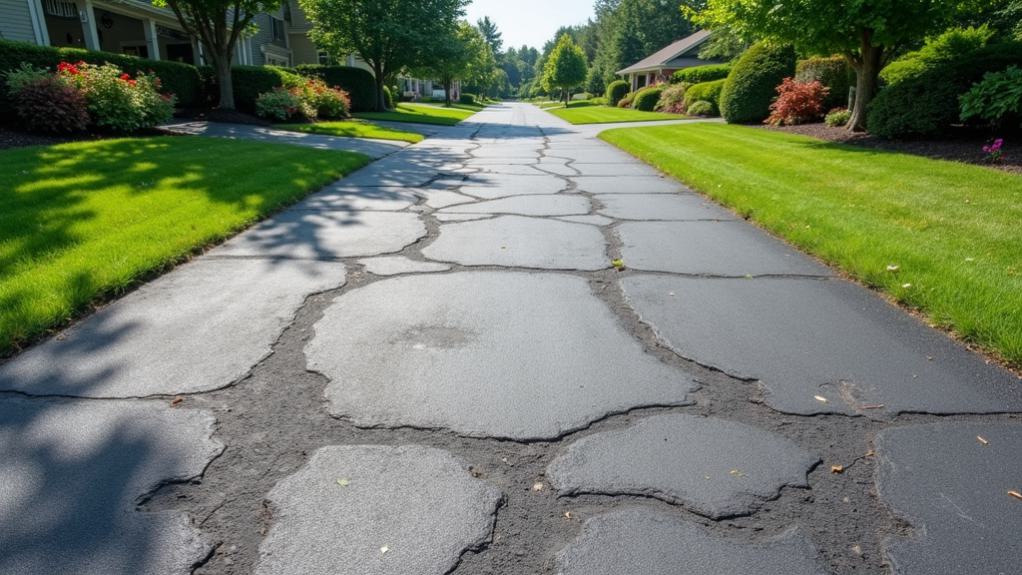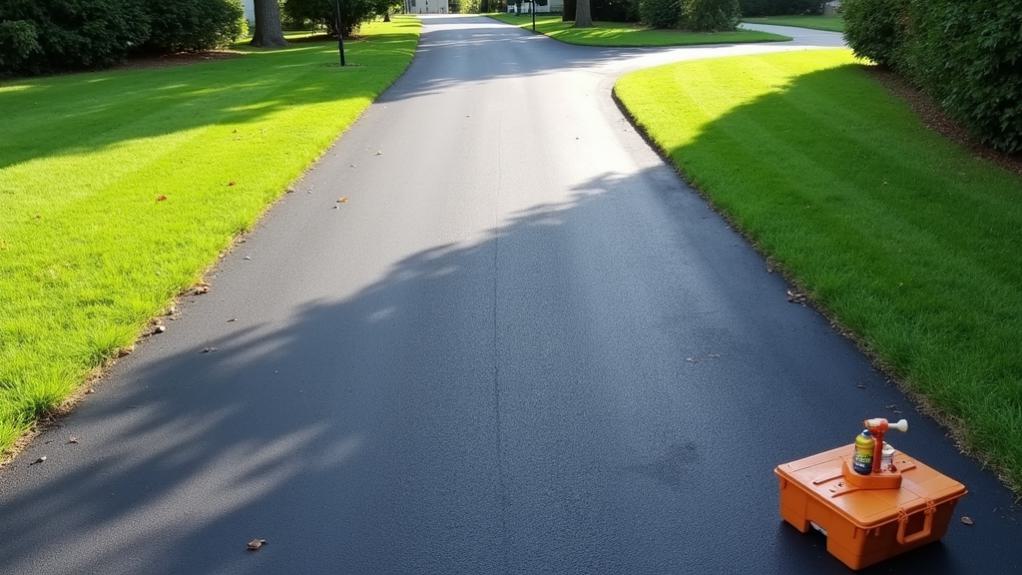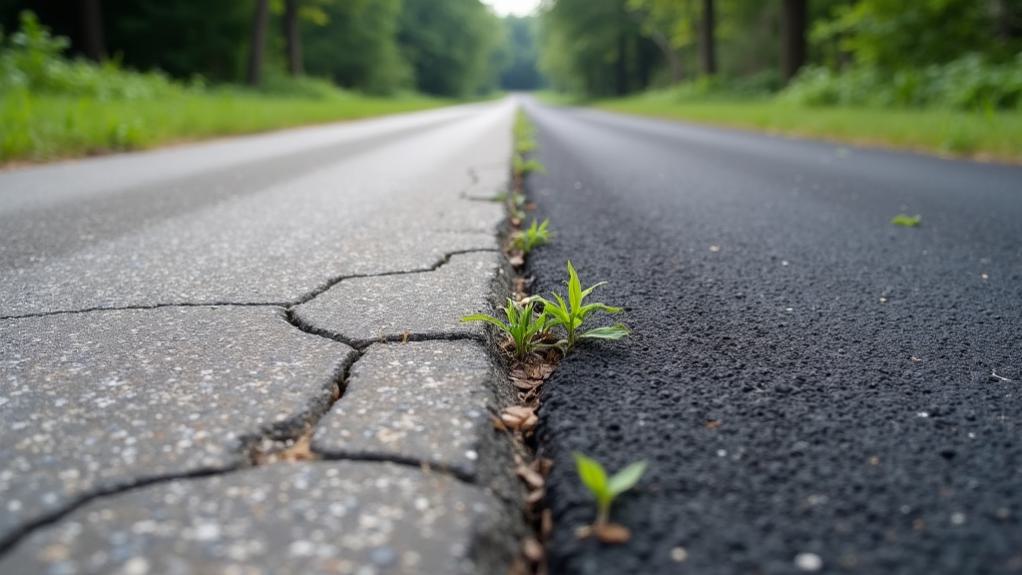Your asphalt driveway can last anywhere from 15 to 30 years, heavily influenced by factors such as installation quality, traffic load, and maintenance practices. If you maintain it properly—applying sealant every 2-3 years and repairing cracks or potholes promptly—you could extend its lifespan considerably.
However, neglect can cause deterioration, leading to potential replacement within 15 years, especially in harsh weather conditions. Remember, regular maintenance is essential for durability and structural integrity. By understanding these elements, you can make informed decisions about your driveway’s care and longevity. There’s more valuable information to uncover regarding ideal maintenance strategies.
Key Takeaways
- The average lifespan of asphalt driveways ranges from 15 to 30 years, depending on maintenance and environmental factors.
- Proper maintenance, including regular sealing every 2-3 years, can extend the lifespan significantly.
- Installation quality, weather conditions, and traffic load play crucial roles in determining durability.
- Neglecting maintenance can lead to deterioration, often requiring replacement after about 20 years.
- Signs of damage, like cracks over 1/4 inch and pooling water, indicate the need for immediate repairs to prolong lifespan.
Lifespan of Asphalt Driveways

The longevity of asphalt driveways is a vital consideration for homeowners seeking durability and cost-effectiveness. The average lifespan of an asphalt driveway typically ranges from 15 to 30 years, with proper maintenance allowing for around 15 to 20 years of service.
To maximize this lifespan, several factors come into play, including the quality of installation, prevailing weather conditions, traffic load, and ongoing maintenance practices. Partnering with a trusted service provider like Nathans Paving guarantees high-quality materials are used.
Regular maintenance is essential; sealing your asphalt driveway every 2 to 3 years and addressing cracks promptly can greatly extend its lifespan. Neglecting these maintenance tasks can lead to accelerated deterioration, requiring replacement after approximately 20 years, especially if you notice wear signs like cracking and pooling water.
High-quality materials and adherence to proper installation techniques are fundamental for achieving the maximum lifespan of your asphalt driveway. These elements not only enhance durability but also improve resistance to environmental damage.
Key Durability Factors
Numerous factors contribute to the durability of your asphalt driveway, greatly influencing its lifespan and overall performance. Understanding these key durability factors can help you maximize the lifespan of asphalt and guarantee a reliable surface.
| Factor | Impact on Durability | Recommended Action |
|---|---|---|
| Quality of Installation | Affects foundation stability and material longevity | Hire professionals for installation |
| Weather Conditions | Extreme heat can soften; cold can crack | Monitor weather and adjust maintenance |
| Thickness of Asphalt | Standard thickness is 3 inches; heavier vehicles may require 4-5 inches | Adjust thickness based on vehicle weight |
Regular maintenance is essential for extending the lifespan of asphalt. Sealcoating every 2-3 years and promptly repairing any cracks or potholes can greatly enhance durability. Additionally, confirming that the asphalt layer is appropriately thick for the type of traffic it will endure will prevent premature wear and damage. By focusing on these key durability factors, you can take proactive steps to protect your investment and enjoy a long-lasting driveway.
Maintenance Best Practices

When it comes to maintaining your asphalt driveway, consistent attention is key to guaranteeing its longevity and performance. Regular maintenance and upkeep can greatly extend the lifespan of your driveway, which typically lasts 15-20 years with proper care.
One of the most effective practices is applying a seal coat every 2-3 years, as this can increase the lifespan of your driveway by 30-50% compared to unsealed surfaces and is a cost-effective maintenance option. This not only protects the asphalt from UV damage and moisture but also enhances its appearance.
Promptly sealing cracks larger than 1/4 inch is essential to prevent moisture infiltration that can compromise driveway integrity. Regular inspections for signs of wear, such as fading or pooling water, should be part of your routine to catch issues early.
Additionally, filling potholes as soon as they appear helps avoid further deterioration and costly repairs.
Maintaining proper drainage away from the pavement is also vital. Water accumulation can weaken the asphalt support, leading to premature failure.
Weather Influence on Longevity
Weather conditions play an essential role in determining the longevity of your asphalt driveway. Extreme temperatures can greatly affect its durability; for instance, hot, dry climates often lead to brittleness, while cold weather can cause cracking due to freeze-thaw cycles.
In areas serviced by professionals with over 10 years of industry experience, these weather influences on longevity are vital factors to take into account, especially if you live in an area with fluctuating conditions.
Moisture accumulation also poses a considerable risk, particularly in humid or wet climates. Excessive moisture can weaken the support beneath the asphalt, increasing the likelihood of premature failure.
Additionally, water infiltration from leaks or rising water tables can jeopardize the structural integrity of your driveway. Without timely repairs, these issues can escalate, leading to costly damage.
To combat these adverse effects, regular maintenance is essential. Activities such as sealing and crack repairs not only address existing problems but also help to extend the lifespan of your asphalt driveway by several years.
Neglecting proper care in harsh weather conditions can reduce your driveway’s average lifespan to as low as 15 years. Hence, proactive measures are vital for preserving your investment.
Repair and Replacement Signs

Regular maintenance can greatly extend the lifespan of your asphalt driveway, but neglecting warning signs can lead to costly repairs or replacements. One of the most vital indicators is cracks larger than 1/4 inch. These cracks signal considerable underlying issues that require prompt repair to prevent further degradation.
Similarly, the presence of potholes necessitates immediate attention, as they can worsen rapidly if left untreated.
Additionally, be aware of fading or discoloration on the asphalt surface. This wear suggests that maintenance or replacement may soon be necessary.
Another essential sign to watch for is pooling water. This often points to drainage problems, which can compromise the pavement’s integrity if not addressed quickly.
Loose gravel and uneven surfaces are also red flags indicating structural failure. Ignoring these signs can lead to safety hazards and further deterioration.
By staying vigilant and addressing these repair and replacement signs promptly, you can greatly prolong the life of your asphalt driveway and maintain its functionality.
Keep a close eye on these indicators to guarantee your driveway remains in peak condition.
Choosing a Paving Professional
Selecting the right paving professional is essential for the longevity and performance of your asphalt driveway. Start by searching for contractors with specialized experience in asphalt paving. This expertise guarantees quality workmanship that can greatly impact your driveway’s lifespan.
Verify that the contractor possesses the necessary licenses and insurance; this protects you from liabilities and confirms compliance with local regulations.
Next, request multiple quotes from different contractors. This comparison not only gives you a sense of the market rates but also allows you to evaluate the services offered.
Don’t settle for the lowest price; make sure you’re receiving competitive rates without compromising on quality.
Additionally, check online reviews and testimonials to assess the paving professional’s reputation. Look for feedback focusing on customer satisfaction and the quality of completed projects.
Finally, confirm that the contractor uses high-quality materials and offers warranties on their work. This approach provides peace of mind and protects your investment in the long run.
Conclusion
To sum up, the lifespan of your asphalt driveway largely hinges on maintenance and environmental factors, much like a car that requires regular servicing to run smoothly. By understanding the key durability factors and implementing best practices, you can greatly extend its life. Keep an eye out for signs of wear and tear, and don’t hesitate to consult a paving professional when needed. With the right care, your driveway can serve you well for years to come.



